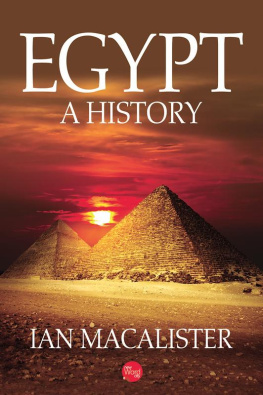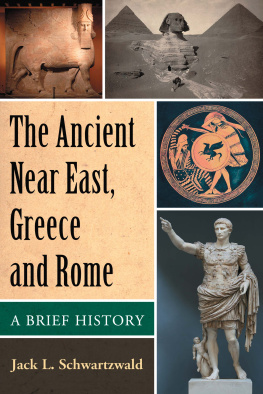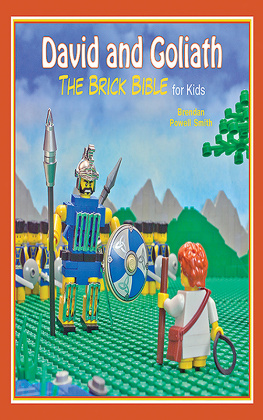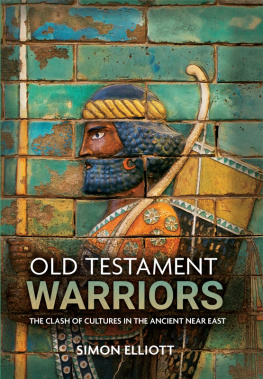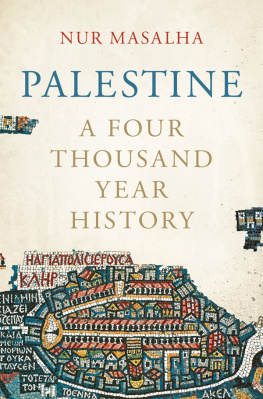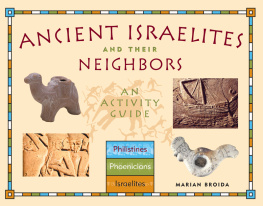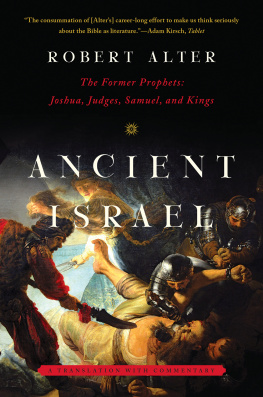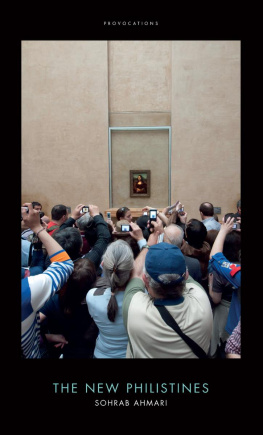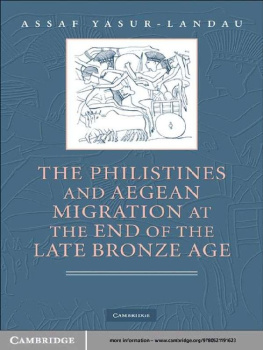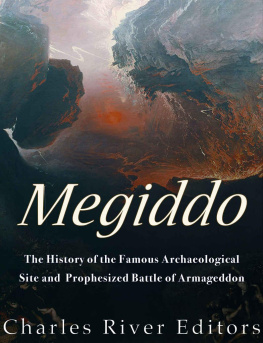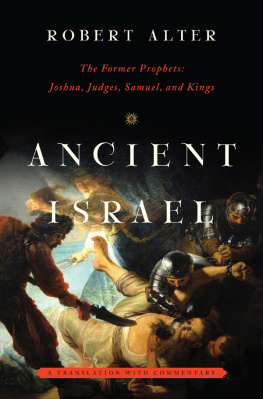R. A. S. Macalister - The Philistines, Their History and Civilization
Here you can read online R. A. S. Macalister - The Philistines, Their History and Civilization full text of the book (entire story) in english for free. Download pdf and epub, get meaning, cover and reviews about this ebook. year: 2021, publisher: Delhi Open Books, genre: Art. Description of the work, (preface) as well as reviews are available. Best literature library LitArk.com created for fans of good reading and offers a wide selection of genres:
Romance novel
Science fiction
Adventure
Detective
Science
History
Home and family
Prose
Art
Politics
Computer
Non-fiction
Religion
Business
Children
Humor
Choose a favorite category and find really read worthwhile books. Enjoy immersion in the world of imagination, feel the emotions of the characters or learn something new for yourself, make an fascinating discovery.
- Book:The Philistines, Their History and Civilization
- Author:
- Publisher:Delhi Open Books
- Genre:
- Year:2021
- Rating:3 / 5
- Favourites:Add to favourites
- Your mark:
- 60
- 1
- 2
- 3
- 4
- 5
The Philistines, Their History and Civilization: summary, description and annotation
We offer to read an annotation, description, summary or preface (depends on what the author of the book "The Philistines, Their History and Civilization" wrote himself). If you haven't found the necessary information about the book — write in the comments, we will try to find it.
This is a comprehensive history of the ancient Philistines, one of the traditional enemies of the Jews in antiquity. This looks at what the Philistines were like and traces their conflicts in the Near East several centuries before Christ.
The Philistines, Their History and Civilization — read online for free the complete book (whole text) full work
Below is the text of the book, divided by pages. System saving the place of the last page read, allows you to conveniently read the book "The Philistines, Their History and Civilization" online for free, without having to search again every time where you left off. Put a bookmark, and you can go to the page where you finished reading at any time.
Font size:
Interval:
Bookmark:
THE PHILISTINES
THEIR HISTORY AND CIVILIZATION
BY
R. A. S. MACALISTER
THE SCHWEICH LECTURES
1913
Among the Nations that came within the purview of the Old Testament Writersnations seldom mentioned without stricture, whether for idolatry, immorality, or crueltyperhaps none were the object of so concentrated an aversion as were the Philistines. The licentiousness of the Amorites, the hard-heartedness of the Egyptian taskmasters, the fiendish savagery of the Assyrian warriors, each of these in turn receives its due share of condemnation. But the scornful judgement passed by the Hebrews on the Philistines has made a much deeper impression on the Bible-reading West than have their fulminations against other races and communities with which they had to do. In English, from at least the time of Dekker, the word 'Philistine' has been used in one or other of the senses of the modern colloquialism 'outsider'; and, especially since the publication of the essays of Mr. Matthew Arnold, it has become almost a technical term for a person boorish or bucolic of mind, impervious to the higher influences of art or of civilization. In French and Germanprobably, indeed, in most of the languages of Europethe word is used in familiar speech with a greater or less approximation to the same meaning.
The following little book is an attempt to collect in a convenient form the information so far available about the Philistine people. It is an expansion of a course of three lectures, delivered in 1911 before the British Academy under the Schweich Fund. In preparing it for publication, the matter has been revised and re-written throughout; and the division into lecturesprimarily imposed by the exigencies of time-allowancehas been abandoned for a more systematic and convenient division into chapters and sections.
It is hoped that the perusal of these pages will at least suggest a doubt as to the justice of the colloquial use of the name of this ancient people.
As it may be well to preserve a record of the syllabus of the original lectures, a copy of it is subjoined.
Lecture I (15 December, 1911). The evil reputation of the Philistines. Recent researches and discoveries. A sketch of the development of Cretan civilization. The Keftiu in the Egyptian records. The sack of Cnossos and subsequent developments. The 'Peoples of the Sea'. Their raid on Egypt. Its repulse. Recovery of the 'Peoples of the Sea' from their reverse. The adventures of Wen-Amon. The earliest reference to the Philistines in the Old Testament. The Abraham and Isaac stories. The references in the history of the Exodus. Shamgar. Samson.
Lecture II (18 December, 1911). The domination of the Philistines. The capture of the Ark and the outbreak of plague. Samuel and Saul. Relative culture of Philistines and Hebrews during the reign of Saul. The incidents of David's outlawry. Achish, king of Gath. Gilboa. The Philistine domination broken by David. The various versions of the story of Goliath. The Philistines under the later monarchy. The Philistines in the Assyrian records. Nehemiah. The Maccabees. Traditions of the Philistines among the modern peasants of Palestine. Theories of the origin of the Philistines. Caphtor and the Cherethites.
Lecture III (22 December, 1911). The Organization of the Philistines. Their country and cities. The problem of the site of Ekron. The language of the Philistines. Alleged traces of it in Hebrew. Their religion and deities. Their art. Recent discoveries. The place of the Philistines in History and civilization.
I have to express my acknowledgements to my friends and colleagues, the Rev. P. Boylan, Maynooth, and the Rev. Prof. Henry Browne, S. J.; also to the Very Rev. Principal G. A. Smith, Aberdeen, and Mr. E. H. Alton, of Dublin University, for allowing me to consult them on various points that arose in the course of this work. The first and last named have most kindly read through proof-sheets of the work and have made many valuable suggestions, but they have no responsibility for any errors that the discerning critic may detect.
The figures on pp. 118, 119 are inserted by permission of the Society for Promoting Christian Knowledge.
R. A. S. M.
Dublin,
New Year, 1913.
The Old Testament history is almost exclusively occupied with Semitic tribes. Babylonians, Assyrians, Canaanites, Hebrews, Aramaeansall these, however much they might war among themselves, were bound by close linguistic and other ties, bespeaking a common origin in the dim, remote recesses of the past. Even the Egyptians show evident signs of having been at least crossed with a Semitic strain at some period early in their long and wonderful history. One people alone, among those brought conspicuously to our notice in the Hebrew Scriptures, impresses the reader as offering indications of alien origin. This is the people whom we call 'Philistines'.
If we had any clear idea of what the word 'Philistine' meant, or to what language it originally belonged, it might throw such definite light upon the beginnings of the Philistine people that further investigation would be unnecessary. The answer to this question is, however, a mere matter of guess-work. In the Old Testament the word is regularly written P e litm ( ), singular P e lit ( ), twice P e lityim ( ), The territory which they inhabited during the time of their struggles with the Hebrews is known as ere P e litim ( ) 'the Land of Philistines', or in poetical passages, simply Peleeth ( ) 'Philistia'. Josephus regularly calls them , except once, in his version of the Table of Nations in Genesis x ( Ant . I. vi. 2) where we have the genitive singular .
Various conjectures as to the etymology of this name have been put forward from time to time. One of the oldest, that apparently due to Fourmont, Who connected the word with Sanskrit valak a 'white', and made other similar comparisons, as for instance between the name of the deity of Gaza, Marna , and the Indian Varuna .
On the other hand a Semitic etymology was sought by Gesenius, even when it is put into the mouths of Goliath or Achish, when speaking of themselves. Of course this is merely an etymological speculation on the part of the translators, and proves nothing more than the existence of a Hebrew root (otherwise apparently unattested) similar in form and meaning to the Ethiopic root cited. And quite apart from any questions of linguistic probability, there is an obvious logical objection to such an etymology. In the course of the following pages we shall find the court scribes of Ramessu III, the historians of Israel, and the keepers of the records of the kings of Assyria, agreeing in applying the same name to the nation in question. These three groups of writers, belonging to as many separate nations and epochs of time, no doubt worked independently of each othermost probably in ignorance of each other's productions. This being so, it follows almost conclusively that the name 'Philistine' must have been derived from Philistine sources, and in short must have been the native designation. Now a word meaning 'stranger' or the like, while it might well be applied by foreigners to a nation deemed by them intruders, would scarcely be adopted by the nation itself, as its chosen ethnic appellation.
This Ethiopic comparison it seems therefore safe to reject. The fantasy that Redslob puts forward, namely, that 'Philistia' was an anagram for , the Shephelah or foot-hills of Judea, is perhaps best forgotten: place-names do not as a rule come to be in this mechanical way, and in any case 'the Shephelah' and 'Philistia' were not geographically identical.
There is a peculiarity in the designation of the Philistines in Hebrew which has often been noticed, and which must have a certain significance. In referring to a tribe or nation the Hebrew writers as a rule either ( a ) personified an imaginary founder, making his name stand for the tribe supposed to derive from hime. g. 'Israel' for the Israelites; or ( b ) used the tribal name in the singular , with the definite articlea usage sometimes transferred to the Authorized Version, as in such familiar phrases as 'the Canaanite was then in the land' (Gen. xii. 6); but more commonly assimilated to the English idiom which requires a plural, as in 'the iniquity of the Amorite[s] is not yet full' (Gen. xv. 16). But in referring to the Philistines, the plural of the ethnic name is always used, and as a rule the definite article is omitted. A good example is afforded by the name of the Philistine territory above mentioned, ere P e litm, literally 'the land of Philistines': contrast such an expression as ere hak-K e naan, literally 'the land of the Canaanite'. A few other names, such as that of the Rephaim , are similarly constructed: and so far as the scanty monuments of Classical Hebrew permit us to judge, it may be said generally that the same usage seems to be followed when there is question of a people not conforming to the model of Semitic (or perhaps we should rather say Aramaean) tribal organization. The Canaanites, Amorites, Jebusites, and the rest, are so closely bound together by the theory of blood-kinship which even yet prevails in the Arabian deserts, that each may logically be spoken of as an individual human unit. No such polity was recognized among the pre-Semitic Rephaim , or the intruding Philistines, so that they had to be referred to as an aggregate of human units. This rule, it must be admitted, does not seem to be rigidly maintained; for instance, the name of the pre-Semitic Horites might have been expected to follow the exceptional construction. But a hard-and-fast adhesion to so subtle a distinction, by all the writers who have contributed to the canon of the Hebrew scriptures and by all the scribes who have transmitted their works, is not to be expected. Even in the case of the Philistines the rule that the definite article should be omitted is broken in eleven places.
Next pageFont size:
Interval:
Bookmark:
Similar books «The Philistines, Their History and Civilization»
Look at similar books to The Philistines, Their History and Civilization. We have selected literature similar in name and meaning in the hope of providing readers with more options to find new, interesting, not yet read works.
Discussion, reviews of the book The Philistines, Their History and Civilization and just readers' own opinions. Leave your comments, write what you think about the work, its meaning or the main characters. Specify what exactly you liked and what you didn't like, and why you think so.


